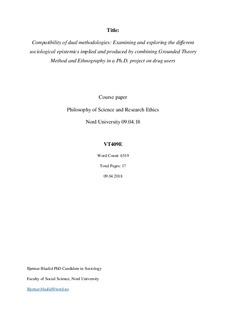| dc.description.abstract | Purpose: The overarching aim of this course paper is to discuss the compatibility of ethnography with grounded theory. More specifically the aim is to show how ethnographers can apply grounded theory as an analytical tool to construct theory from data and link the discussion on the different traditions within grounded theory (and the criticism towards these positions) to my own doctoral thesis in sociology.In the introductory part of the paper, I first give a brief summary of my own Ph.D. project, along with the ethnographic approach I am using to collect data, with methods including documents, participant observations and open-ended interviews.
Background: Since its discovery by Glaser and Strauss in the sixties(Glaser & Strauss, 1967),grounded theory has evolved,and today, three ‘main’ perspectives dominate its influence. These three consists of Glaser’s approach, Strauss and Corbin’s approach and a later version, called constructivist grounded theory, with Charmaz being one of its most prominent figures(Annells, 1996). Embarking on the journey of discussing these scholars viewsand different perspectives on grounded theory , it is important to clarify that dividing grounded theory into three ‘main camps’,as I have, is a way of simplifying a complex methodology, done in the interest of making a meaningful discussion possible within the scope of this course paper. Therefore,continuing on, I do not set out to cover all the extensive questions and concerns that can arise when combining grounded theory with ethnography, or try to give a complete view on this methodology as a whole.
Originality/value: This paper, written with the ambition of exploring methodological questions found within the philosophy of science, contributes to my project by offering critical and important reflections on how ethnography and grounded theory might be compatible. Further, I investigate how combining the two methodologies might be effective in my research project, and I discuss arguments and views made by the most prominent members of the different grounded theory ‘camps’, related to disadvantages and advantages of applying one of the variants of grounded theory for my specific research project. However, despite delimiting the discussion to focus on arguments related to methodological challenges within my own project, the paper will still be written with the wider methodological context in mind, implying that I will draw on empirical research and perspectives of notable scholars,both from the field of grounded theory and of ethnography. | nb_NO |
